The prize was for the paper's efforts to secure a clampdown on the way some charities treated supporters and fundraisers - an issue that came to public attention with the suicide of 92-year-old poppy seller Olive Cooke who had been bombarded with cold calls and mailshots from nearly a hundred charities
The Mail was quick off the mark and once it got the bit between its teeth, it was unstoppable.
By this time next week we shall have discovered how "unknowing and vulnerable" Boris Johnson and Michael Gove are. What we have already seen is that the Mail is even more tenacious in their service than it was for the charity collectors.
The Mail's campaign to secure a vote to leave the EU was in full swing a month before it collected the Cudlipp award, and it has been relentless ever since.
Campaigning journalism is an honourable pursuit. But there is a line between campaigning for a cause you believe to be right and propaganda. And with its Brexit coverage, the Mail has stepped over that line.
The Sun may be less mean-spirited, but it is also aggressively anti-Europe, and the Telegraph has hardly been impartial. So why pick on the Mail?
Because it is the most dangerous.
The Sun is still - just - our top-selling newspaper, but its influence is waning; advertisers are deserting it and politicians no longer court it the way they used to. With circulations around the half-million mark (let's be generous), the Express and Telegraph aren't in the same league.
The Mail, though, is by far the biggest news brand across print and web, reaching more than 10 million people every day. If Britain votes to leave the EU next week, the paper might well be justified in stealing the Sun's clothes and declaring "It was the Mail what won it".
Depending on your view of Europe, that might be a good thing for the country.
But it won't be a good thing for journalism.
For, however strongly the paper believes that the UK would be better off out of Europe, it still has a duty to abide by the Editors' Code (which happens to be
overseen by its own editor). That doesn't oblige a paper to be neutral or even to offer balanced coverage, but it does demand accuracy and a clear distinction between comment, conjecture and fact.
The pro-Europe InFacts organisation has reported a number of papers to Ipso, complaining that they have failed to measure up on accuracy. Of course judgments won't be handed down before polling day, and we can expect plenty more transgressions in the final week. Short of having a licensed Press - heaven forbid - there is nothing any regulator, Leveson recognised or not, can do to stop them.
And, anyway, the Mail is a slick organisation - easily the most professional outfit in Fleet Street. It knows exactly how to maintain "accuracy" while pushing its own agenda. It is far more likely to get caught out mixing up comment, conjecture and fact.
So I thought it would be an interesting exercise to look closely at the Mail's tactics.
1: When someone puts forward an argument for leaving the EU, make it the page lead.
Make the speaker sound as important as possible, as in "the head of one of Britain's biggest..."
Try not to give the Remain camp a right of reply, and certainly not more than a par or two at the end.
2: If someone who favours staying in the EU concedes a possible advantage to leaving, make that the intro - even if it runs counter to the thrust of the full comment/speech.
3: If giving prominence to a pro-Remain story is unavoidable, dilute the message, ideally by getting the retaliation in first, as in "Downing Street was accused of..."
Always get a Vote Leave quote in the first six pars.
For financial and political types, a "fact box" showing how they have been wrong in the past is best.
For others, it is enough simply to question their right to express an opinion, perhaps by getting someone to suggest that they should stick to the day job (this can be done in a leader if there is no one available to supply the requisite quote).
Do not do this with pro-Brexit claims.
5: Get leading Brexit campaigners to write first-person pieces. Michael Gove (whose wife is a Mail columnist), Iain Duncan Smith, Priti Patel and Andrea Leadsom have obliged on several occasions.
1: Pro-Leave stories should have a positive heading. Words to use: thrive, boost, boom.
Attribution is not necessary, but "Gove", "Boris" or "IDS" are acceptable.
2: "Now" is a useful word when you want to say "guess what those idiots want us to believe this time", while staying within the Editors' Code.
3: Words to use when reporting Remain campaign stories: propaganda, doom, project fear, fury.
Foreign leaders, such as Barack Obama or Angela Merkel who think the UK should stay in Europe are bullying or lecturing us.
1: John Longworth, former head of the CBI, "a hero crushed in a chilling witch-hunt against free speech". But not the "scaremongering" CBI
2: Norway, Holland and Switzerland (in certain circumstances). But not the leaders of Germany or the United States.
3: Cameron's former policy adviser Steve Hilton. But not former Cabinet Secretary Gus O'Donnell.
4: Big employers Tim Martin of Wetherspoons, Lord Bamford and James Dyson. But not BT, BMW or Rolls-Royce. There is "fury" when they warn their tens of thousands of employees about the risks of leaving.
5: Andrea Leadsom, "high flier" Energy Minister. But not her boss, Amber Rudd, whose brother Roland is a prominent Remain campaigner.
6: Penny Mordaunt, whose appearances in the Mail before the referendum campaign started were mostly in swimwear. But not William Hague, who used to be sound but never fulfilled his potential.
8: Military leaders. But not environmental charities.
9: Norman Lamont, who was Chancellor on Black Wednesday. But not John Major, who appointed him.
10: Still in the past: David Owen and Nigel Lawson (whose son writes for the Mail). But not Michael Heseltine and definitely not "spiv" Peter Mandelson.
11: Former MI6 chief Richard Dearlove and former CIA boss Michael Hayden. But not former CIA chief David Petraeus.
12: Former Archbishop of Canterbury George Carey when he says immigration has reached dangerous levels, and present incumbent Justin Welby, when he says it's not racist to worry about immigration.
But Welby is not to be believed when he says the poor would suffer most from Brexit. On that we should trust Iain Duncan Smith who says the poor would suffer most from staying in.
13: Boris, when he says the EU is like the Third Reich. But not Dave, when he says it has saved us from war.
14: Cameron and Osborne's fathers-in-law. But not Cameron or Osborne.
15: Michael Gove's father if he's talking to the Mail or Star about his defunct fishing business. Bute not if he's talking to the Guardian or Mirror.
16: Any member of the public who challenges Cameron. But not any former living Prime Minister.
Dead ones, such as Churchill and Thatcher are to be believed if they are deemed to support the Brexit cause, but not if Fatty Soames starts spouting about his Grandad.
This is tricky.
The general rule is don't believe bankers - they are the people who caused the global financial crisis in 2008 and so sacrificed any right to be heard ever again.
But it's ok to listen to Antonio Horta-Osario, the Portuguese head of Lloyds (even though we don't generally like to be dictated to by foreigners), and to former HSBC chief Michael Geoghegan (even though the bank is now guilty of "talking down" the pound). Gerard Lyons, a former Standard Chartered economist who advises Boris Johnson, can also be trusted.
Goldman Sachs is sound when its analysts suggest that we'd be fine outside of Europe, but not as a US giant bank-rolling the Remain campaign - and definitely not as Bank of England Governor Mark Carney's alma mater.
Carney himself should keep his mouth shut - except when he's saying that leaving the EU won't destroy the economy. Mervyn King, who is known to be critical of the euro, should be encouraged to speak up about the EU. So far he hasn't obliged.
Banks such as JP Morgan and Citigroup, which threaten to pull out of the UK after a Brexit are trying to bully us.
The IMF, World Bank, OECD and IFS are all to be doubted, but the Chamber of Commerce is reliable, and fund manager Peter Hargreaves is so well-informed that his views are reported at every opportunity.
Some case studies
Over the past four months, the Mail has produced hundreds of news pages, scores of leaders, and printed dozens of opinion pieces about the EU. It's impossible to reproduce them all here, but it would be nice to highlight a few.
Last March, the Mail ran a factbox alongside a Bank of England report suggesting that Brexit might hit investment from overseas. It listed foreign firms that were giving the UK a "vote of confidence" , including Toyota, Nissan and Airbus, who had all said they would continue production in the UK even if it left the EU. The three also featured in a Leave campaign leaflet.
This week Airbus, GE and Unilever complained to Vote Leave about the use of their logos, saying that it misrepresented their view on Europe, which was to remain. Toyota and Nissan, which have stated their belief that Britain would be better off in Europe, were also said to have been upset.
The FT and Independent both splashed on the firms threatening to sue; the Mail did not report the story.
It did not, however, report the sharp falls in the FTSE index after polls showed the Leave camp in the ascendancy.
Nor did the Sun. Indeed, after four days of trading that saw losses reach £100bn, it found an analyst to predict that leaving the EU would act as a "rocket boost" for shares, lifting them by 5%. Share values had fallen by 6% over the previous week.
The committee also questioned the Chancellor's assertion that families would be an average of £4,300 worse off if Britain left the EU.
The Mail majored on the criticism of the Remain claims, but its sub-head mentioned that both campaigns had come under attack. SubScribe felt that most newspapers' coverage of the report was poor.
For all its support of the Leave agenda, the Mail does not appear ever to have reported or endorsed the £350m a day claim.
| In March Penny Mordaunt came under Andrew Pierce's scrutiny as part of a spread about female politicians who "flaunted their assets". He said nobody had taken any notice of her until she took part in the TV diving show Splash in 2014 and from that time on, the Mail's preferred photograph of her was this one in the blue bathing costume. Until she started arguing for Brexit. Now she is the Armed Forces Minister and is always pictured in businesswear, complete with Maggie-style handbag. |
Sitting alongside is a story about 307 Cambridge academics expressing concern about the effect of leaving the EU on universities. There is no counter view here, either, but a reference back to the fears of 150 Royal Society fellows expressed two months previously. And then, in a couple of blob pars at the bottom, we learn that "the world-famous theorietical physisist" Professor Stephen Hawking has also come out for Remain.
So the opinion of one retired insurer is equal to those of 458 academics - and four times as much as our most renowned scientist.

On June 7, the paper splashed on delays to the approval of a breast cancer drug caused by EU "red tape". It acknowledged that even if approved, the drug might be too expensive to be allowed by NICE, but there was no mention of how long it might take for such a drug to work its way through the testing system if Britain were not part of the EU mechanism - the very point Stevens was making.
No paper could possibly list every politician who comes out on one side of the debate or the other, but the Mail knows what its readers think of Martin McGuinness and is therefore pleased to point out that he favours IN. It makes sure to mention his IRA connections in both the heading and the intro.
European Council president Donald Tusk came up with some dramatic imagery in an interview with Bild, including that he feared a British vote to leave could be the beginning of the end of the EU and Western political civilisation. He also said that radical anti-European forces would be drinking champagne in the event of such a vote and that Brexit would be so dangerous because no one could foresee the long-term consequences: "Every family knows that a divorce is traumatic for everyone. Everyone in the EU, but especially the Brits themselves, would lose out economically,"
The Mail reports only half the "end of civilisation" quote, but manages two mentions of Project Fear and devotes three of the five pars to Leave campaigners, including the ever-reliable Priti Patel. It also runs a leader describing the interview as "the daftest scare yet".
Sir Mike Wade's email to 80,000 BT workers gets a straight intro in the third story of this set, but by the second par, eurosceptics are "seizing on" his "track record as a cheerleader for Brussels" and the fact that he was against holding a referendum at all.
We are then reminded that Wade was in favour of joining the euro in 2003, and we finish with a quote from arch-eurosceptic Bill Cash saying Wade should concentrate on improving BT. The headline is not on what Wade has done, but on some "fury" that is not apparent in the text.
It might argue that it's not the same, since the Mail isn't a politician or a participant in the debate.
Isn't it?
The Express has run none.
In the meantime, the cloud below shows some of the headline words used in the Mail's news pages in relation to the Remain campaign.

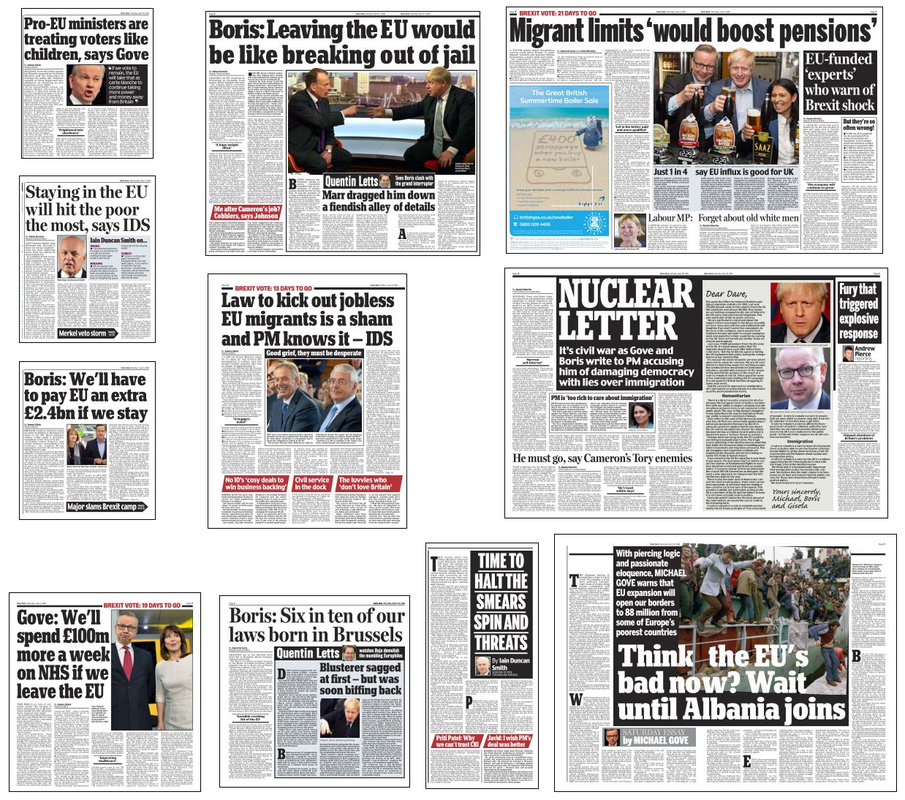
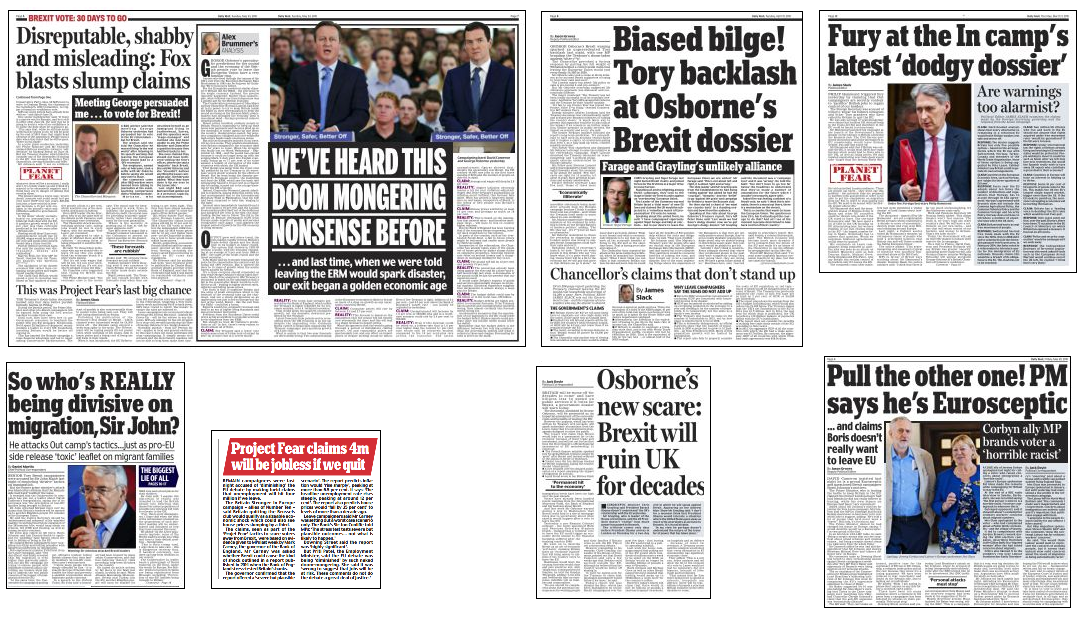
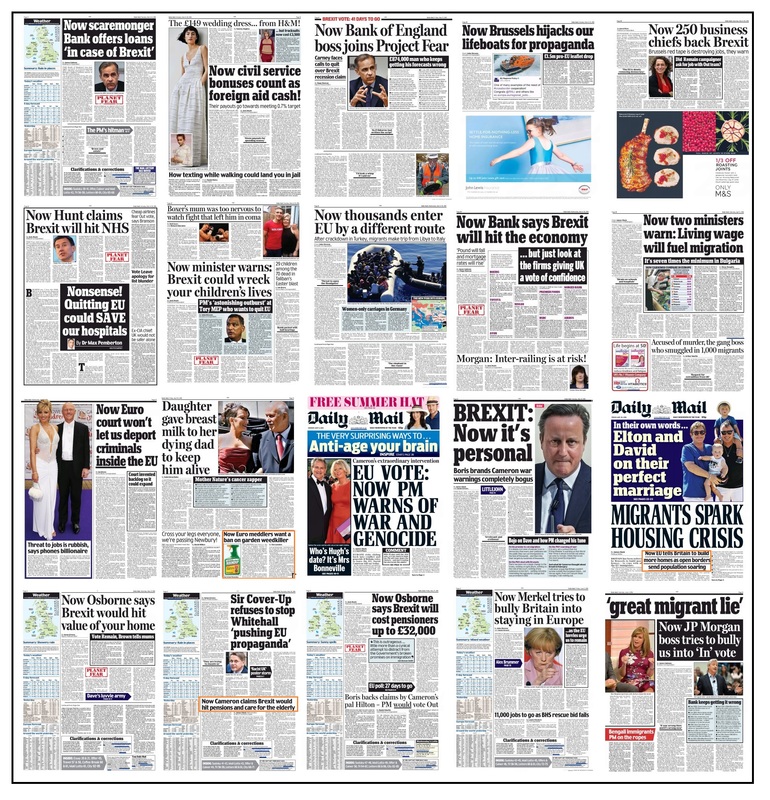
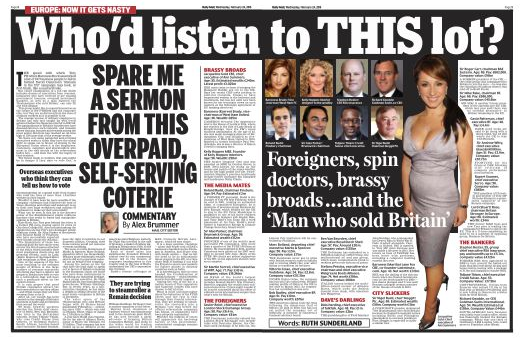
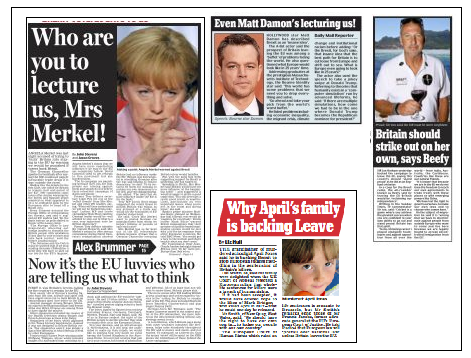
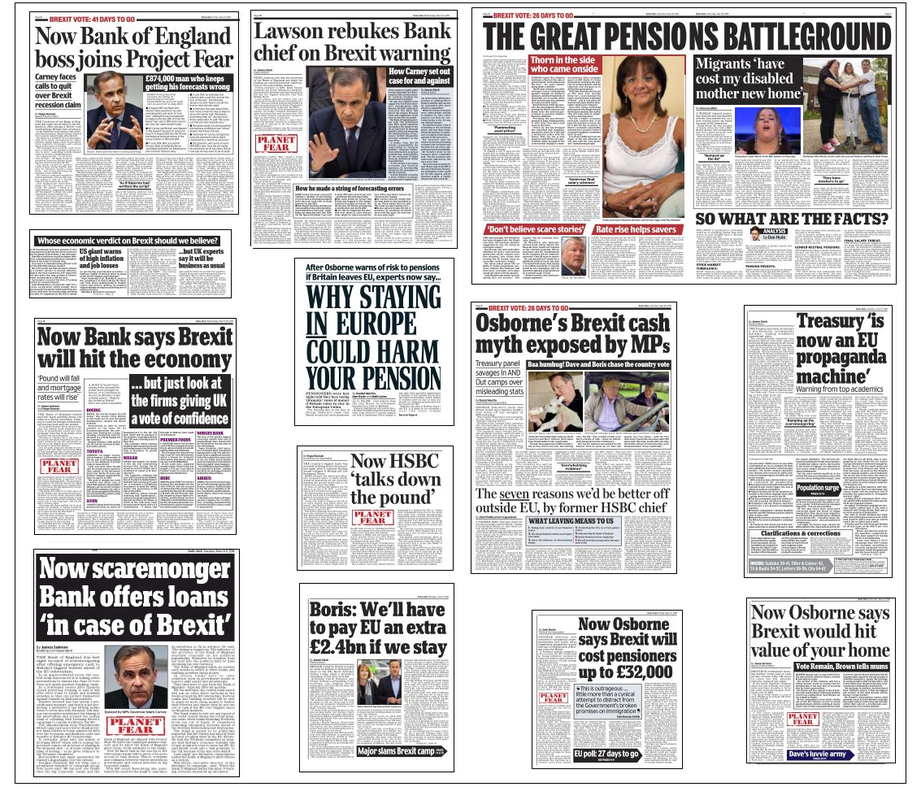
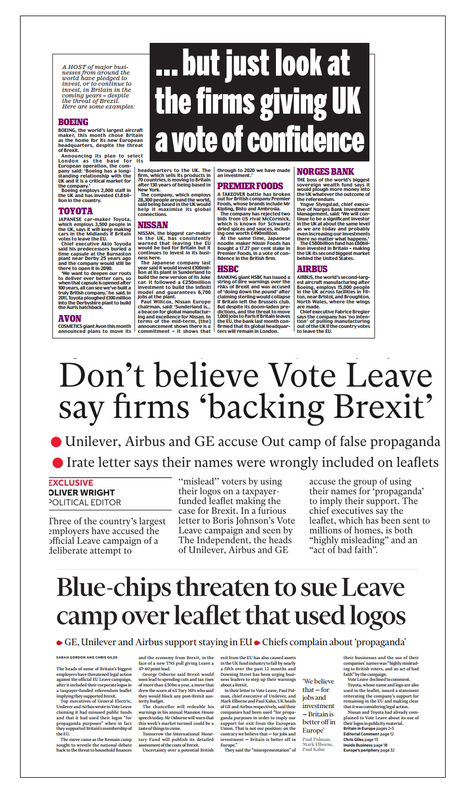
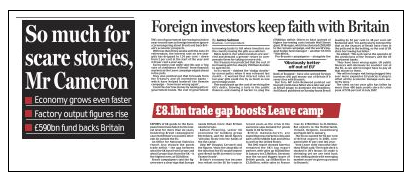
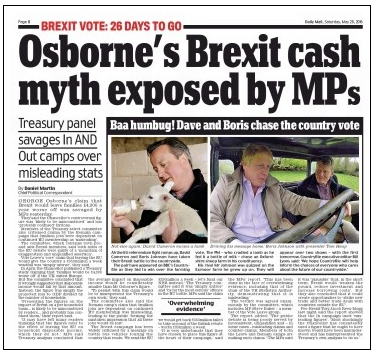
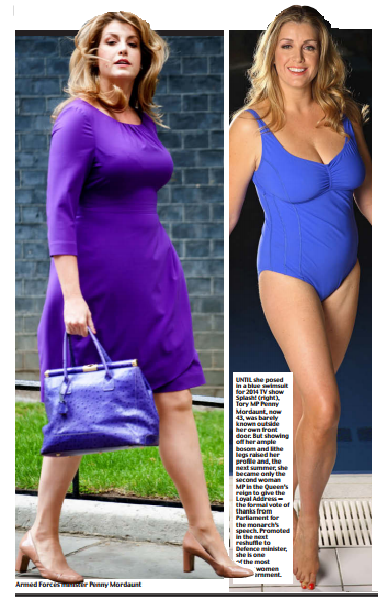
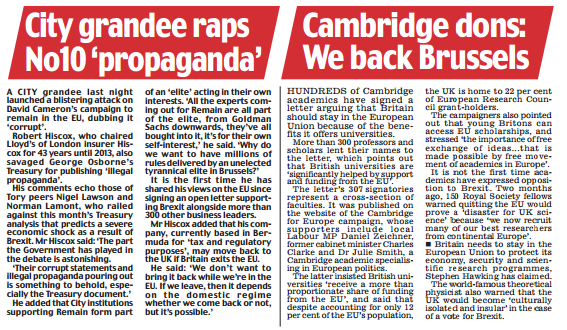
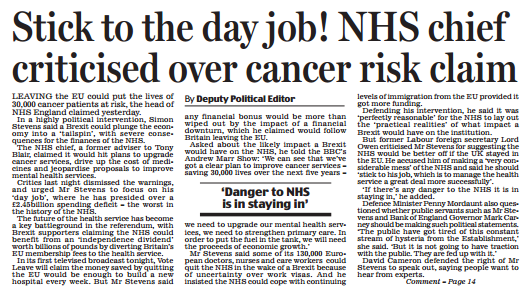

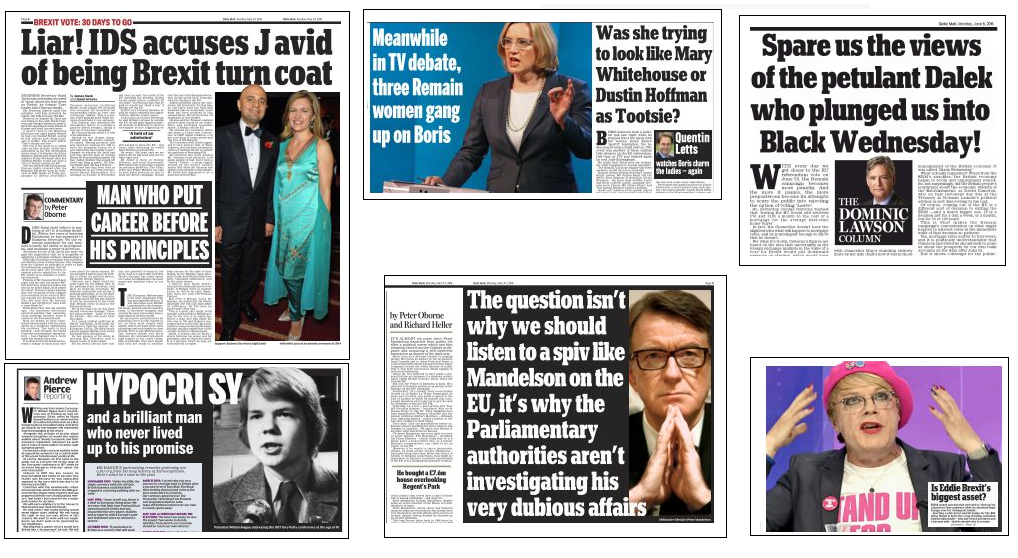

 RSS Feed
RSS Feed


